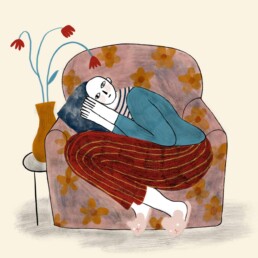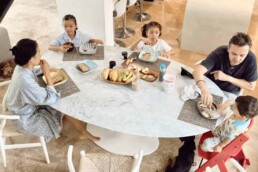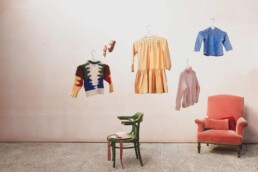Childhood cancer awareness month
A personal story by Beau Johnston.

Beau is a cheery school girl of 16. She’s bright, funny and studies hard. She loves dance, gymnastics and surfing in the North Sea. To meet her you would know nothing of her life with cancer. Diagnosed with a brain tumor at the age of 2 Beau has since undergone brain surgery and 7 rounds of chemotherapy. She has navigated the normal challenges of growing up whilst dealing with the physical and emotional consequences of getting treatment for a brain tumor. This is Beau’s experience in her own words:
Hi! I’m a 15-year-old girl with cancer, and this is my story of growing up with cancer.
Cancer. The word makes you feel uneasy, doesn’t it? Well, unfortunately It has been part of my life every single day since I was 2 years old. Growing up is difficult enough let alone growing up with cancer. Most people must navigate hurdles in their childhood while I must navigate mountains.
I don’t remember my diagnosis, or the start of my journey with cancer due to how young I was. I think this is a good thing as it’s often the most traumatic and scary part of having cancer. I often wonder whether my brain has actively decided to erase those memories because of how horrific they must have been. Although I think these memories have been deleted, it feels as though they haven’t been removed but instead locked away in a secret part of my brain that is hard to access. I say this because I have triggers or certain things that make me uncomfortable for no apparent reason: the smell of anaesthetic gas, hospital sick bowls, certain foods.
When you lose all your hair you can’t keep your illness hidden from anyone any longer and suddenly you become “the sick girl”.
Throughout my journey of having cancer, I have had 7 courses of chemo and one brain surgery. The brain surgery has, ironically, been erased from my memory. Surgery was the first treatment I received for my tumour, it is often the first type of treatment people receive when they are diagnosed. This is done so that they can determine what the tumour is, through biopsy, and ideally, if safe, fully remove it.
Fortunately for me, most of mine was removed safely. Unfortunately, because of its location in my brain, they were unable to remove all of it without me losing my vision. So, after surgery, I was left with a small part of my tumour remaining which surrounded the optic nerve. This small, residual, section of tumour has meant that I have had to endure seven courses of chemo throughout my childhood, each one having a different effect on me.
The worst part about having cancer is undoubtably chemotherapy. Chemo is the medicine that gives you the stereotypical bald Casper look (the friendly ghost) that most people associate with cancer. Chemo is horrible. There are very few words I can say that will ever truly describe what it feels like, but I can tell you one thing: it is horrendous. Certain chemo courses are better than others and each chemo affects everyone differently. Not all chemo’s make you lose your hair and believe it or not, not all chemo’s make you feel unwell.
The most commonly asked question I get about chemo is about losing hair. Loosing your hair feels like part of your identity has been stolen from you and there is nothing you can do about it. When you get to the stage of losing your eyebrows and eyelashes you almost feel unrecognisable to yourself. The worst part about it is you stand out and you can see everyone looking at you and pitying you. When you lose all your hair you can’t keep your illness hidden from anyone any longer and suddenly you become “the sick girl”.

The type of nausea and exhaustion you experience with chemo is almost inexplicable. After I receive chemo, I usually sleep for three days straight, only waking for meals and that’s not even an exaggeration. This tiredness is a result of the least harsh chemo’s. On the harshest chemo I slept for roughly six days straight. Once I get over the phase where I sleep for entire days I still feel completely drained. It almost feels like I’ve not slept for days whilst also feeling like I haven’t eaten, my head feels cloudy, and it takes a lot more energy even to achieve basic tasks such as having a shower.

One of the main effects chemo has on your body is that it kills many of your blood cells – this is usually the reason for the tiredness. One effect this has on my daily life is that I must stay away from crowded areas, wash my hands frequently, keep a distance from people and stay away from anyone with colds. Sound familiar? 😉Yes, that’s right. The insane and irritating ways in which people have had to drastically change their behaviour during COVID-19 are normal for people on chemo. In a way people having to change their behaviour during COVID-19 was quite comforting, as for once people were experiencing a small part of my reality.
Due to my bloods being low I get my bloods taken weekly to ensure that my levels don’t drop dangerously low. The blood tests check for the levels of three main things: red blood cells, white blood cells and platelets. The number of red blood cells determines how much oxygen is carried around my body. The level of white blood cells determines how well I can fight off infection. And finally, the level of Platelets determine how easily I bruise and recover from injuries- this one is the most important for me to know as I am a gymnast and dancer, so I need to know when it is safe for me to do tricks and when it is not.
I get my bloods taken through a tube called a port-a-cath. This is a tube that goes under my skin and allows me to receive chemo and have my bloods taken. There is a little “bubble” (a very non-technical name, because frankly I have no clue what it is called) on one end of the tube and this lies under my skin and is where the needle is inserted to take my bloods or give me chemo. I get the area of skin on top of the bubble numbed before the needle is inserted because otherwise it is incredibly painful, and the freeze spray helps numb the pain slightly. Each person has a different ritual when they get their port accessed, it is just about finding what suits the individual best. Getting my line accessed is just second nature now and doesn’t affect me at all, but it is always a difficult process to get used to at the beginning (most toddlers need to be pinned down by their parent or nurse to be able to have it done).
the level of Platelets determine how easily I bruise and recover from injuries- this one is the most important for me to know as I am a gymnast and dancer, so I need to know when it is safe for me to do tricks and when it is not
Another thing I often get asked about is MRI scans and what they are like. An MRI is a scanner that take photographs of your body to determine the size of your tumour. My scans are currently every three months. MRI scans are the part of growing up with cancer that you never get used to and it doesn’t get easier. It seems like the simplest thing ever, in fact it is! Whilst I am in the scanner, I am extremely relaxed however, mentally scans are a minefield. They are the most mentally torturous part about having cancer, and I can’t think straight until I hear the words “It’s good news, the scan is stable”.
The process of being scanned isn’t too bad – it is the waiting that hurts most. During the scan they lie you down on a completely horizontal bed with your head in a rest, they put earphones over your head to drown out the relentless thumping and clattering of the machine and then they reverse the bed backwards into this cylinder. The worst part about it is the length of time it takes, and the noise it makes. The time is only an issue as it gives you time to think, and that is rarely a good thing to do around scan time. The noise is just about bearable. It hammers through your brain and sends shockwaves through your body. Halfway through the scan they insert contrast which allows my tumour to show up on the scan better.

written by Beau Johnston
Illustrations by Sophie Jackson – https://www.lasophiejackson.com
Read part 2 of the article | September is Childhood Cancer Awareness Month.
You might also like
October 24, 2024
A Day in the Life… Margaux Giudicelli, Loumio
A day in the life of a kids' swimwear brand owner. Looking for new sustainable swimwear to offer your customers. Well check out eco-friendly, stylish, and protective children’s swimwear for a…
September 18, 2023
An IG Nightmare Story by Photographer Karen Holt
The stress both professionally and personally of clicking on your IG app only to discover that you have been mysteriously 'locked out' is immense. None of the 'steps' worked to log back in, and the…
February 17, 2023
Formidable Family – The Thompsons, Koh Samui Thailand
An impressive mix. The Thompsons family of five are an impressive mix. Mum Heidi is Korean/ American whilst Dad Scott is Hong Kong/ British. Gracie is 10, Phoebe is 8 1/2 and little brother Isaac…
October 7, 2022
Home grown remedies: Head lice
Rosemary & lavender nit treatment.A natural formula for effective nit treatment free from organophosphates. Easily found ingredients, simple to make and use. Great for getting rid of both the…
September 18, 2022
Growing up with cancer – part 2 of 2
Childhood cancer awareness month
A personal story by Beau Johnston.
August 26, 2022
Home grown remedies: Hot flushes
Raspberry leaf and sage teaRaspberry leaves are well known for balancing female hormones, whilst sage is good for reducing sweating. Combine the two and we have a refreshing drink that can help…
June 2, 2022
Introducing Lolie
What is Lolie ? More than a kids’ store - Lolie is a new European marketplace with an irresistible blend of compelling content and unique product selection. Ranging from the much loved Spanish label…
June 10, 2021
Lemon Magazine – closing an issue explained
Keeping it Reel: How to clear your head!Founder and ‘Boss Mom’ of “Lemon magazine” Barbara Perino talks us through closing an edition of the magazine and what helps her to…
March 26, 2020
Living with Coronavirus
It's worse than we know in the UK... I’m writing this sat upright in bed feeling like a sumo wrestler is parked on my chest, just short breaths in and out. I had been feeling a little unwell - a dry…











